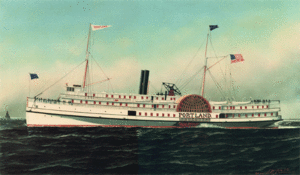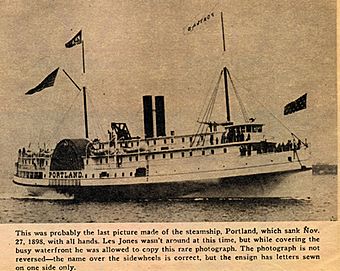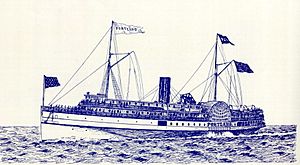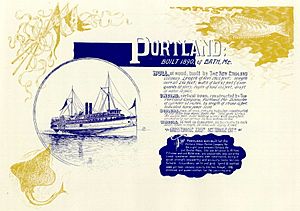- This page was last modified on 17 October 2025, at 10:18. Suggest an edit.
Portland (shipwreck) facts for kids

PS Portland at sea, by Antonio Jacobsen.
|
|
| History | |
|---|---|
| Name | PS Portland |
| Namesake | Portland, Maine |
| Owner |
|
| Route | Atlantic Ocean between Portland, Maine and Boston, Massachusetts |
| Builder | New England Shipbuilding Co., Bath, Maine |
| Cost | $250,000 |
| Launched | October 14, 1889 |
| Homeport | Portland, Maine |
| Fate | Sank on 27 November 1898, during the Portland Gale |
| General characteristics | |
| Type | Passenger paddle steamship |
| Tonnage |
|
| Length |
|
| Beam |
|
| Draft | 10 ft (3.0 m) |
| Depth of hold | 15 ft 6 in (4.72 m) |
| Decks | Three |
| Installed power | (1) 62-inch-bore (1.6 m), 12-foot-stroke (3.7 m), 1,200-horsepower vertical-beam steam engine with (2) boilers |
| Propulsion | (2) 35-foot-diameter (11 m) paddlewheels; each having (26) paddle buckets, 8 ft × 2 ft (2.4 m × 0.6 m), dipping 4 ft (1.2 m). |
| Speed | 12 knots (22 km/h; 14 mph) |
| Capacity | 156 staterooms accommodating 700 passengers; 400 tons freight |
| Crew | 63 |
|
PORTLAND (Shipwreck and Remains)
|
|
 |
|
| Lua error in Module:Location_map at line 420: attempt to index field 'wikibase' (a nil value). | |
| Nearest city | Gloucester, Massachusetts |
| NRHP reference No. | 04001473 |
| Added to NRHP | January 13, 2005 |
The PS Portland was a huge steamship that used large paddlewheels on its sides to move through the water. It was built in 1889 to carry passengers between Boston, Massachusetts, and Portland, Maine. The ship is famous because a terrible storm in 1898 was named after it: the Portland Gale. This massive blizzard hit the coast of New England, causing over 400 deaths and sinking more than 150 ships.
Contents
Building the Portland
The Portland's wooden body, called a hull, was built by the New England Company in Bath, Maine. Its powerful 1,200-horsepower steam engine was made by the Portland Company. This engine had a large cylinder that was about 5 feet wide and a stroke (how far the piston moved) of 12 feet. The ship also had two big iron boilers, which were built in Bath, Maine, at the Bath Iron Works.
The Portland was built for the Portland Steam Packet Company. It cost $250,000, which was a lot of money back then! The ship was meant to carry passengers overnight between Boston and Portland. At the time, it was one of the biggest and fanciest paddle steamers in New England. For nine years, it was known as a very safe and reliable ship.
The Last Trip of the Portland
On November 27, 1898, the Portland left Boston, heading to Portland, Maine. It was following its usual path. But the crew didn't know that a very strong storm, called the Portland Gale, was quickly moving north. Even though the Portland was a safe ship, it was not ready for such extreme weather.
During the storm, the Portland sank off the coast of Cape Ann. Everyone on board was lost. We don't know the exact number of people because the only passenger list went down with the ship. At first, newspapers thought between 99 and 118 people were lost. Only 16 crew members and 35 passengers' bodies were found. Today, experts believe the Portland was carrying between 193 and 245 people, including 63 crew members. This was the worst steamship disaster in New England before the year 1900.
Finding the Shipwreck
The shipwreck of the Portland lies about 460 feet deep in the Atlantic Ocean. It is near Gloucester, Massachusetts, in a special protected area called the Stellwagen Bank National Marine Sanctuary. The wreck was first found in 1989 by John Fish and Arnold Carr. In 2002, the National Oceanic and Atmospheric Administration (NOAA) confirmed the find. They used ROVs (remotely operated vehicles) to take pictures of the sunken ship. The wreck was added to the National Register of Historic Places in 2005.
Exploring the Portland Wreckage
In 2008, five scuba divers from Massachusetts became the first people to reach the steamship. Some people call it the "Titanic of New England." The divers made three successful trips down to the wreck. They said the ship was full of items like stacks of dishes, mugs, wash basins, and toilets. They did not find any human remains. The divers could not explore below the deck because it was too dangerous.
Because the wreck is so deep, some of their dive lights broke from the pressure. They could only explore the site for 10 to 15 minutes before they had to return to the surface. The divers were not allowed to take any items from the wreck. This is because of the rules in the Stellwagen Bank National Marine Sanctuary.


